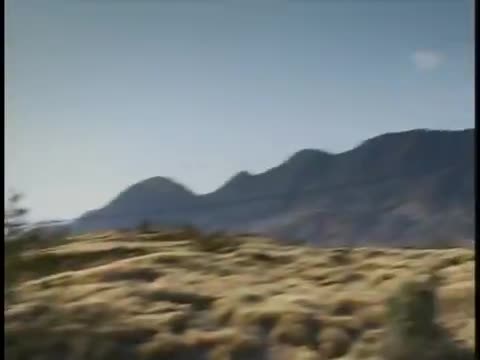NOVA; Top Gun Over Moscow; 2315

- Transcript
Dawn breaks in western Nevada. A crowd has gathered. The race of the century. In this race there are no drive. No human behind the wheel. These robots are on their own. Can a machine navigate miles of punishing desert terrain. The speed and agility. Of A. Driver. The largest team in the competition is from Carnegie Mellon in Pittsburgh. Trailing by former Marine red Whitaker the red team is a well-funded army of computer wizards and engineers. Whitaker has staked his reputation on winning the Grand Challenge. The red team of transforming this new Hummer into a more aggressive machine called. Highlander. With the robots know nothing about their environment and they can't think like
humans but they're really good at crunching numbers. Most rely on laser range finders to perceive the world. Inside a beam of light bounces off a spinning mirror and sweeps the terrain ahead by measuring the time it takes to hit something in return. The range finder can measure its distance from the vehicle scanners are mounted in pairs to measure different things. Some look for smooth road ahead. Others look for the road edge on each side. Some look for vertical objects a rock or a fence post that can kill the robot. Putting it all together this becomes Highlander's view of the world. A road map made from millions of numbers that basically tells the robot paid for school. The red tab on the order of a million lines of computer code.
Even so. They do very simple reason about the world they look for flat spots. Flat is good flat spots. Anything that's not flat. At the vertical even compared to the Red Team Stanford is a small group with a single focus on software. The Stanford team is putting its hopes in a set of off the shelf lasers linked through software to a simple video camera the camera can see all the way to the horizon. The trick is to give Stanleys some way to distinguish the rows in the video image by overlapping the laser and video data. Stanley can identify the color of the smooth area and search for it in the rest of the video image area Stanley believes his say is now shown in red by matching laser and video data on the fly. Stanley can adapt to changing road conditions and determine safe driving
speeds all by itself. Making it a car we need intelligent requires to give an ability to adapt is just like a human life. We don't enable kids to have a rule for every contingency. We tell them how to learn from contingencies and make them smile. And then we trust them to. Stanford is the only team using adaptive vision to achieve race species whether it will work well enough for the Grand Challenge will soon become clear. With the race course is a circular may zig zags for one hundred thirty two miles across the Mojave desert near the outskirts of Las Vegas with a 10 hour time limit. The race with next week agility and indoors that no machine has ever demonstrated on its own in the 30 miles into the race. Hylander is making time. Robots are starting to like that.
Hylander seem to come down the hill very smartly but then as it started to mow the next hill it looked like the engine cut off. It just stopped moving and slid. Something was wrong with her and it did not have its normal get up and go. Highlander keeps on rolling but cannot maintain its intended. Behind it stance is rapidly approaching. The crowd. Got. A blue dot appears in the distance. After driving 6 hours and 53 at an average speed of 90 miles an hour. Stanley is about to become the first vehicle in history. To drive a hundred thirty two
miles. My it's. Behind me that sent me all the way to the desert and all three of them did the unthinkable. It's such a fantastic success for this I think.
- Series
- NOVA
- Program
- Top Gun Over Moscow
- Episode Number
- 2315
- Contributing Organization
- WGBH (Boston, Massachusetts)
- AAPB ID
- cpb-aacip/15-7m03x83r5j
If you have more information about this item than what is given here, or if you have concerns about this record, we want to know! Contact us, indicating the AAPB ID (cpb-aacip/15-7m03x83r5j).
- Description
- Description
- Airplane show at Zhukovsky Air Base; Shots of parked Soviet fighter planes, CU details of planes and missiles. Crowds of visitors walking between planes.
- Date
- 1995-00-00
- Asset type
- Raw Footage
- Topics
- Science
- Subjects
- bombers; Missiles; cockpits; Cold War; MiGs; military jets; Russian war planes; Soviet aircraft; fighter planes
- Rights
- Rights Note:None,Rights:Work for hire,Rights Credit:WGBH,Rights Type:All,Rights Coverage:In perpetuity,Rights Holder:WGBH
- Media type
- Moving Image
- Duration
- 00:05:58
- Credits
-
- AAPB Contributor Holdings
-
WGBH
Identifier: 8bccc009a14421a05726bed5e4c229e48432c9e6 (ArtesiaDAM UOI_ID)
Format: video/quicktime
Color: Color
If you have a copy of this asset and would like us to add it to our catalog, please contact us.
- Citations
- Chicago: “NOVA; Top Gun Over Moscow; 2315,” 1995-00-00, WGBH, American Archive of Public Broadcasting (GBH and the Library of Congress), Boston, MA and Washington, DC, accessed May 14, 2025, http://americanarchive.org/catalog/cpb-aacip-15-7m03x83r5j.
- MLA: “NOVA; Top Gun Over Moscow; 2315.” 1995-00-00. WGBH, American Archive of Public Broadcasting (GBH and the Library of Congress), Boston, MA and Washington, DC. Web. May 14, 2025. <http://americanarchive.org/catalog/cpb-aacip-15-7m03x83r5j>.
- APA: NOVA; Top Gun Over Moscow; 2315. Boston, MA: WGBH, American Archive of Public Broadcasting (GBH and the Library of Congress), Boston, MA and Washington, DC. Retrieved from http://americanarchive.org/catalog/cpb-aacip-15-7m03x83r5j